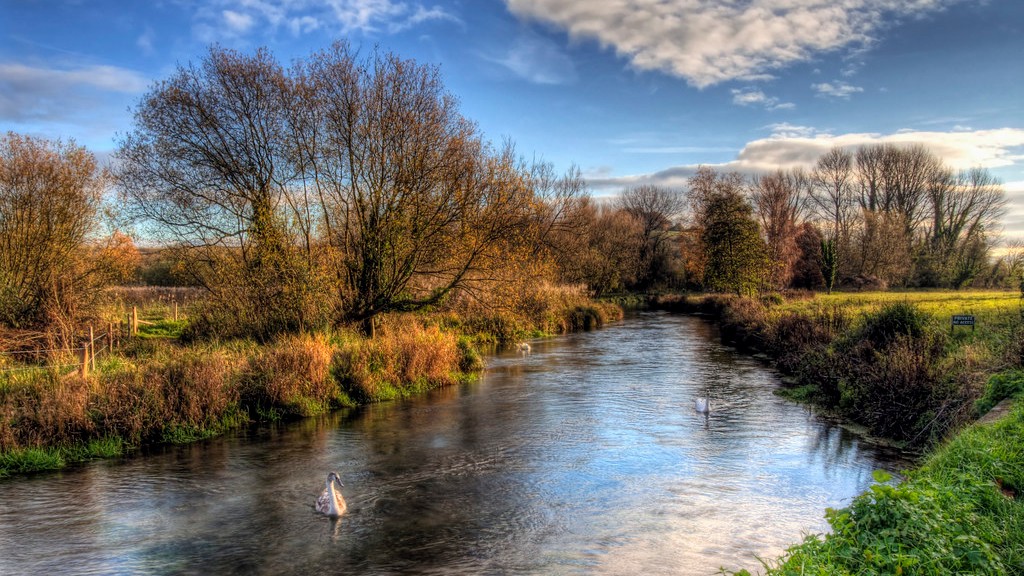The ancient Egyptians had an interdependent relationship with the Nile River due to its ability to provide water, food and transportation. This relationship can be seen in the development of their civilization, which was closely tied to the annual flooding of the river. The Egyptians had a deep reverence for the Nile and built many religious sites along its banks. In understanding why Egypt developed along the Nile River, it is important to look at both historical and environmental explanations.
Historically, the Nile provided an effective means to unify different parts of Egypt. The regular flooding of the Nile enabled the production of fertile soil and an abundant food supply. This, in turn, allowed for population growth and the development of advanced civilizations. In addition, the Nile provided a means of transportation, making it easier to travel between points and spread ideas. Settlements in different parts of Egypt were connected by the Nile, which helped foster communication and exchange of goods.
From an environmental perspective, the Nile provided the right conditions for human settlements to thrive. The floods provided the land with a regular, predictable supply of fresh water and nutrients, essential for sustaining life. The land around the Nile was also more hospitable than the rest of Egypt, with temperatures that were significantly lower than in the desert regions. This allowed the area to sustain a larger population and allowed the Ancient Egyptians to build their iconic monuments, such as the Great Pyramids.
The ancient Egyptians were also heavily reliant on the Nile for food. Fish from the river were a staple in the ancient Egyptian diet, and the river was also an important source of aquatic plants such as papyrus which were used for making paper. The Nile was also instrumental in the development of their intricate irrigation systems, which allowed for the sustained production of crops.
The Nile had a profound effect on the development of Ancient Egypt. It provided food, water, transport, and resources. Its floods allowed for the growth of fertile soil and an abundant food supply, while its comparatively cooler climate allowed for the construction of towering monuments and facilitated cultural exchanges between different parts of Egypt. Ultimately, the Nile was essential to the development and success of the Ancient Egyptian civilization.
Social Impact
The Nile had a huge social impact on the development of ancient Egyptian society, connecting different parts of the country and establishing a unified political entity. It was an essential lifeline in terms of trade, enriching the economy and facilitating the exchange of goods and ideas between different settlements. The Nile also enabled the growth of certain professions, such as fishermen and farmers, whose livelihoods were directly dependent on the river.
The river also played an important role in the spiritual lives of the Ancient Egyptians. They believed that the river was the abode of the gods, housing several important deities like Osiris, the god of the dead. The banks of the Nile were often lined with temples dedicated to these gods and were the site of many religious festivals, such as the Festival of the New Year.
In addition, the Nile served as an important source of inspiration for literature and art. Numerous works of art featured the Nile and its gods, many of which were inscribed on the walls of temples. The Egyptians also composed plenty of literature and poetry in praise of the river and its inhabitants. The Nile therefore provided the Ancient Egyptians with a source of connection to the divine and has become a symbol of their civilization.
Economy
The Nile was the foundation upon which the Ancient Egyptians built their economy. The annual flooding of the river renewed the land and replenished grains, vegetables, and other agricultural products. This crucial cycle allowed for the growth of cities and international trade, as goods could be transported downriver with relative ease. In addition, the river served as an important source of raw materials for industry. Papyrus was an essential component of their production process and was used to make paper, clothing, and boats.
The river was also an important trade route, connecting the Mediterranean Sea to Egypt and to other parts of Africa. However, its strategic position could be a double-edged sword. Egypt was often caught in the middle of various conflicts, leading to its decline and eventual conquest by the Romans.
The Nile was essential to the economic stability of Ancient Egyptian society. It provided an invaluable source of food and raw materials that established a dependable agricultural cycle and enabled Egypt to flourish. While the threats posed by its strategic position could not be avoided, Egypt still managed to maintain an impressive level of trade thanks to their reliance on the river.
Significance
The Ancient Egyptians were deeply connected to the Nile and heavily relied on it for their well-being. It was an integral part of their religious beliefs and provided a sense of connection to the divine. It enabled the growth of a powerful economy and allowed for the rapid development of settlements and cities. Overall, the Nile was essential to the success of ancient Egypt, providing the necessary resources and connections to the world beyond it.
The Nile is often referred to as the “cradle” of Egyptian civilization and its importance cannot be overstated. It is no coincidence that the most ancient and influential period of Egyptian history was during the time of the Nile’s floods. The river was an inexhaustible resource and an integral part of many aspects of Ancient Egyptian life. Its continuous flow helped shape not just the physical features but also the cultural and spiritual aspects of the Nile Valley.
Agriculture
The Nile was pivotal to the Ancient Egyptians’ agricultural success. The regular flooding of the river allowed for the production of rich, fertile soil, making it the perfect environment for crops production. In addition, the river’s waters allowed for the growth of aquatic plants and fish, both of which were essential to the Ancient Egyptian diet. The irrigation systems coupled with the Nile’s flooding allowed for the cultivation of a large variety of plants and sustained the rich agricultural tradition of Ancient Egypt.
The Ancient Egyptian agricultural system was heavily dependent on the river and its flooding. The Egyptians had developed a sophisticated irrigation system that enabled them to effectively control the flooding and reduce their losses. This led to the growth of a prosperous economy and the successful cultivation of grains, fruits, and vegetables.
The fertile soil of the Nile Delta region also enabled the production of beer and wine, which was a major source of income and became an important part of the culture. The wine-making process was so important to the economy that it was tightly regulated by the government, with overseers assigned to ensure that the quality of the product did not suffer.
The Ancient Egyptians were heavily reliant on the Nile for the growth of their agricultural sector. The river’s floods provided an abundance of fresh water and enriched the land, allowing for the production of a wide variety of crops and the cultivation of aquatic plants and fish. Ultimately, it was the combination of the Nile and the Ancient Egyptians’ irrigation system that led to their agricultural success.
Influences
The Nile had a lasting influence on Ancient Egypt’s culture, economy, and religion. It enabled the growth of powerful cities such as Thebes and Alexandria and facilitated the exchange of goods and ideas between different parts of the civilization. It is no coincidence that the most prosperous period of Ancient Egypt coincided with the times of the Nile’s flooding.
The river also served as a source of inspiration for literature and art, with numerous works of art featuring the Nile and its gods. It was a central part of Ancient Egyptian religion and was believed to be the abode of the gods. This reverence of the Nile can be felt in the architecture and monuments built along its banks, such as the Valley of the Kings and the Great Pyramids.
The Nile was also a crucial factor in the development of Ancient Egyptian agriculture. Its regular flooding enriched the soil and led to the growth of a prosperous farming sector. The agriculture industry was so successful that it became the backbone of the economy, with the production of beer and wine becoming an especially important aspect.
The Nile was a force that shaped the Ancient Egyptians’ culture and economy. It provided sustenance, inspiration, and a sense of connection to the divine. In understanding why Egypt developed along the Nile River, it is important to recognize its various influences and the impact it had on the ancient Egyptians.





